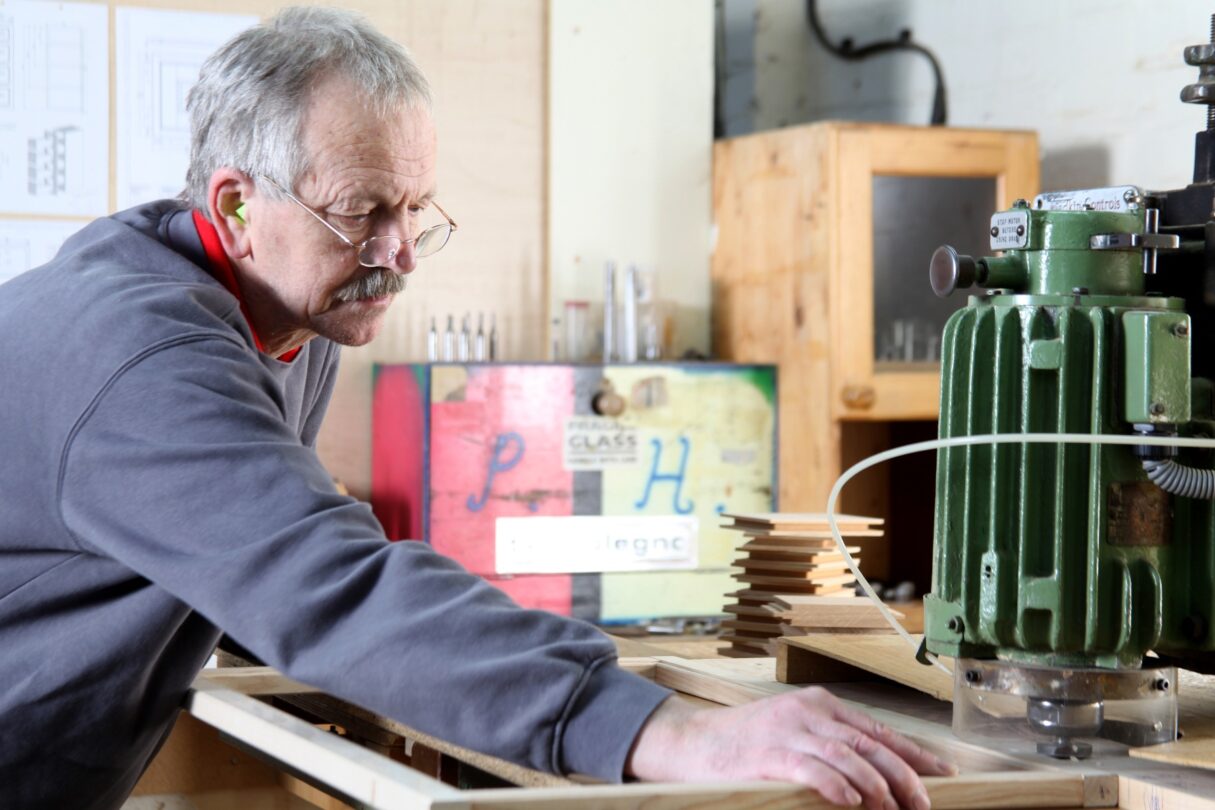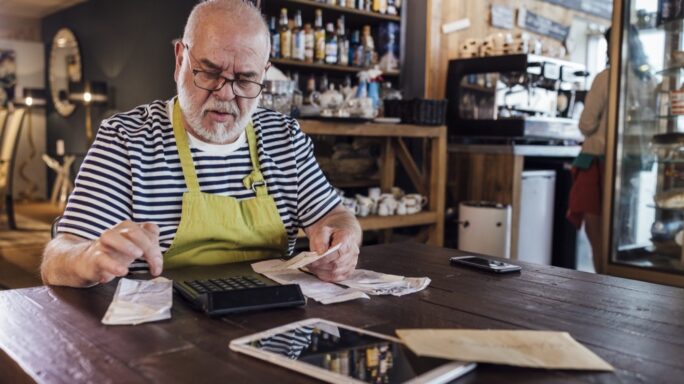Burbidge: ‘Our business survived two world wars, but coronavirus is one of our biggest challenges’
The MD of Burbidge talks about challenges his business faces due to coronavirus and what's being done to overcome them.

In our Your Story series, we speak to business owners about the challenges they’re facing and the steps they’re taking to overcome them. In this interview, Ben Burbidge, the managing director of UK kitchen manufacturer Burbidge, talks about how his business is dealing with the coronavirus disruption and offers advice that could help your company.
Our business has always been hands-on. Burbidge was founded in 1867 by my great-great grandfather, Henry Burbidge, as a woodworking company.
The business subsequently survived two world wars, serving the war effort and then evolving to meet new demands. We reached our 150th birthday in 2017.
Now Burbidge is one of the UK’s leading manufacturers of kitchen ranges and we’ve been awarded the Manufacturing Guild Mark by the Worshipful Company of Furniture Makers.
Even when our business was flattened by German bombers in the war, we bounced back. But coronavirus is one of our biggest difficulties in our 153 years of business.
However, we created plans early on and are working hard to keep things moving.
Think laterally to get paid – and top the list for creditors
The biggest challenge has been cash flow and having enough money to pay people.
The whole of the senior sales operation has become a credit control operation. But the issue is, of course, that our customers’ businesses are shut. They’re saying they will deal with it when they’re back.
So, I’m ringing people myself. When someone other than the credit controller rings up, it has more substance. I tell them: “Don’t just go to ground.” And they realise that they do need to keep the cash flowing.
“The biggest challenge has been cash flow and having enough money to pay people”
We’re not taking an aggressive approach. We’re just speaking the truth, and we try to understand their position. But by ringing them, we are definitely getting ourselves higher up the payment list.
Trying to get hold of customers can be hard. But we’ve been going through our salespeople’s contacts. Most have mobile phone numbers listed for customers. And the customer will pick up the phone when we call this number.
In other words, using non-standard channels to chase money is wise.
Confront difficulties and forecast for the future
We’ve created best case, worst case and middle forecasts.
This is based on optimistic and pessimistic assumptions. For example, a number of our customers are reaching retirement. Some are small husband-and-wife-type businesses.
If they’re faced with the prospect of taking out loans for the coronavirus disruption, they’re probably saying: “Well, that’s it. I’m not going to do it anymore.”
We’re trying to build a picture of customer base changes. This means we’re also talking to customers about future business and there’s a couple of quite interesting developments that I’ve been able to focus on that I wouldn’t have been able to in normal times.
We were already in initial conversations and I’ve managed to accelerate that.
We’re also examining the business in a very granular way and having a really good rake through all areas. We’re looking at how much of every item we sell and looking at the margins on every item.
We’re really thinking about the areas where there probably are more hidden costs than we recognise in some of the things we do.
It’s thinking about productivity after the disruption ends. How we can become leaner and more productive? It’s a fundamental, strategic process.
Lean on your informal networks for advice
We’re taking advantage of all the business support that we see as applicable to us. If the government offers it, you grab it.
We normally have 85 people who work for us and 75 are furloughed. All of the operations at the manufacturing and distribution end, and most of our telesales operation, are furloughed. There’s only a limited group remaining that are in daily contact.
The evening the announcement was made about the Coronavirus Job Retention Scheme grant, we decided very quickly that we had no choice but to close the business. We knew our customers were shutting down.
We applied for a Coronavirus Business Interruption Loan with our bank. We’re doing that more as a precaution. It has a relatively short payback term, so it looks quite expensive. We’ll see how it goes and then decide over the coming year how we’ll deal with it.
We are receiving the business rates holiday and are taking advantage of the VAT deferral date too.
It’s about trying to decide what’s relevant and trying to talk to the people who really have useful things to contribute. You plug into networks.
I’m in some WhatsApp business groups, for example. And a good friend of mine is the private equity chairman of a number of different businesses. He was doing six loan applications at the same time.
Move out of your comfort zone to reassure staff
I recorded a video saying where we’re at. I found it quite difficult because I’ve never done it before. It was just me, talking into the camera.
We then sent that out to all the staff. And it got a really good response, with people saying they were pleased to hear it. The furloughed staff are worried, obviously.
We made sure that we had everyone’s private email address in advance in case everything shut down. We didn’t actually have that before.
We’ve created a director’s group in Microsoft Teams. I’d say we’re in as close contact as we would normally be.
One morning, for example, we had an hour-long video conferencing call. We’re an established team where we all know what the others do, so it’s a natural process.
We have a little chat to begin with to see how everyone is. There’s a bit of leg pulling, and then we get down to it. I create a list of things that I want to talk about or have answers to.
You quite quickly organise around it to make the most of when everyone’s together.
I also ring round people who are still working just to make sure they’re OK and have a chat to see what’s going on in their various areas.
I think we’re getting increasingly refined at video conferencing. It’s something that I would use in future.
We generally work in an office but once the disruption is over, maybe our marketing director can spend more time out of the office, which would obviously be beneficial from the point of meeting with customers.
Co-ordinate with your supply chain
We suspended the business with quite a full order book so, in the short term, we’ll be looking at how best to fulfil that once the disruption ends.
Then we’ll look at the likely sales uptake over the six months up after getting back into business. We’ll be trying to forecast the week by week and month by month likely levels of order intake.
We anticipate a lag of around three months until things are back to normal because of kitchen and bathroom sales and retail processes. People won’t be planning kitchens.
We’ll have to look at who’s been paying us, and who hasn’t. We’ll be looking at the order of production and actually whether we can bulk up some of the things that we would normally make in individual quantities because we’ve got enough orders to do.
Our supply chain is not big. A lot of it is based in Italy and, of course, Italy completely shut down before us. The difficulty will be coordination.
“We’re feeling excitement but there is some fear of the future, because of the unknown”
If Italy comes back, which you imagine it would do at least two weeks before us, then we’re looking at scheduling of goods. We don’t want to have stock pouring in at the point where we’re not really producing. It will be a fine balance.
We’ll be looking at leanness and how we can do things more in a lean way.
We’re feeling excitement but there is some fear of the future, because of the unknown: how long it’s going to last, and when it’s all going to end.
What state is the world and the market going to be in when do we start to roll things out again?
My top five takeaways
Here’s what’s worked best for our business.
1. Be proactive in solving problems but also think outside the box
I found phoning our customers brought real results when chasing outstanding debts. Normal business rules no longer apply – or perhaps it is best to say they are suspended – and this creates space to bend the rules when required.
I didn’t find that people took umbrage to my getting in touch with customers, and in fact the response was very positive.
2. Call on the wisdom of your team
We are lucky in that our senior team has been together for five years. But I have been sure to solicit the opinions of my senior management team via regular video conferencing calls.
When chasing up customers, I called upon our sales staff so I could get the mobile phone numbers I required.
We are experiencing a time when making use of every available resource can make all the difference.
3. Create plans
We created several different kind of cash flow projections based on a pragmatic assessment of our business landscape.
We are creating several plans for how we are going to get up and running as soon as possible once the disruption ends. It’s important to be as pragmatic as possible throughout and take a realistic view.
This doesn’t have to be depressing. We looked at both optimistic and pessimistic projections, for example. It’s simply about being prepared.
4. Communicate with your team
We live in a difficult time when any communications are valued more than usual – if only because so many of us are working from home.
I communicated with our furloughed employees, for example, and the feedback was heart-warming.
It’s certainly the case that too many communications with customers can become annoying, but getting in touch with people within every part of your business is certainly not harmful and people are thirsty for information and reassurance.
Again, the usual rules of business are suspended right now and this provides a certain latitude.
5. Make use of all resources
I spoke to friends to get advice and consulted the website of our local authority. I signed up for their email too, which has proved very useful. I’m a member of some WhatsApp groups for local business people.
Things are changing so rapidly right now that finding out vital information is not just a challenge but takes skill. There’s a lot of misinformation out there too, of course.
Ben Burbidge was talking to Sage Advice’s Keir Thomas-Bryant.
Want to share Your Story?
If you'd like to tell your business story on Sage Advice and share how you've overcome challenges, send us your details to learn more.





